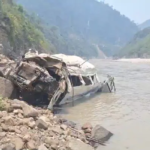Railway Board Chairperson Jaya Varma Sinha stated that the top priority is to provide the best possible medical care for the injured.
Eight people, including three railway staff members, were killed when a goods train rear-ended the Silchar-Sealdah Kanchanjunga Express at 8:55 am today, according to railway officials.
The accident occurred when the goods train, reportedly having jumped a signal, collided with the Kanchanjunga Express on the same track. The impact caused three coaches of the express train to derail, with one coach ending up on top of the goods train’s locomotive.
Among the deceased were five passengers and three railway staff members: the locomotive pilot, assistant locomotive pilot of the goods train, and the guard of the express train. Nearly 50 others were injured. Officials noted that the casualties could have been higher if not for the placement of the last two coaches of the express train, which were a guard coach and a cargo van.
The collision involved four coaches of the Kanchanjunga Express and the engine and five containers of the goods train, near Rangapani station close to New Jalpaiguri. Rescue operations are now complete.
Impact and Response
The Kanchanjunga Express traverses the Chicken’s Neck, a narrow corridor connecting the Northeast with the rest of the country. Due to the accident, at least 10 trains have been diverted.
Chief Public Relations Officer of the Northeast Frontier Railway, Sabyasachi De, stated that the cause of the accident is under investigation. Although some trains have been diverted, movement is not expected to be significantly hampered due to the use of the Aluabari-Siliguri-New Jalpaiguri line.
Railway Board Chairperson Jaya Varma Sinha confirmed the deaths of the loco pilot, assistant loco pilot of the goods train, and the guard of the express train. She emphasized that the priority is to provide the best possible medical aid to the injured, who have been taken to the North Bengal Medical College in Siliguri. Unaffected portions of the train are being sent to their destination for passenger convenience. Helpdesks and helpline numbers have been set up for the families of the victims.
Inquiry and Kavach System
Ms. Sinha announced an inquiry into the accident and acknowledged that the Kavach anti-collision system had not been implemented on the route. However, it is planned for the Delhi-Guwahati route, which will cover sections in Bengal and Assam once implemented. The absence of the Kavach system was also highlighted after the triple train collision in Odisha’s Balasore in June last year, which resulted in 293 deaths and over 1,200 injuries.
About the Kavach System
Kavach, meaning “armour” in Hindi, is an anti-collision system developed by the Research Design and Standards Organisation (RDSO) to achieve “zero accidents.” It is Safety Integrity Level 4 (SIL-4) certified, the highest level of certification, indicating a probability of just one error in 10,000 years. The system uses high-frequency radio communication and continuously updates movement to prevent collisions, automatically activating brakes if an accident is imminent. The cost of implementation is ₹50 lakh per km, significantly lower than similar technology used in other countries.
The system has been implemented on 1,500 km of tracks so far, with plans to cover an additional 3,000 km this year. India’s railway network spans over 1 lakh km.
Helpline Numbers
Railways have released the following helpline numbers:
Sealdah: 033-23508794 and 033-23833326
Guwahati: 03612731621, 03612731622, and 03612731623












